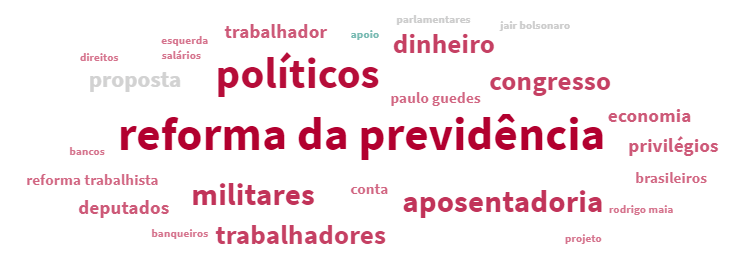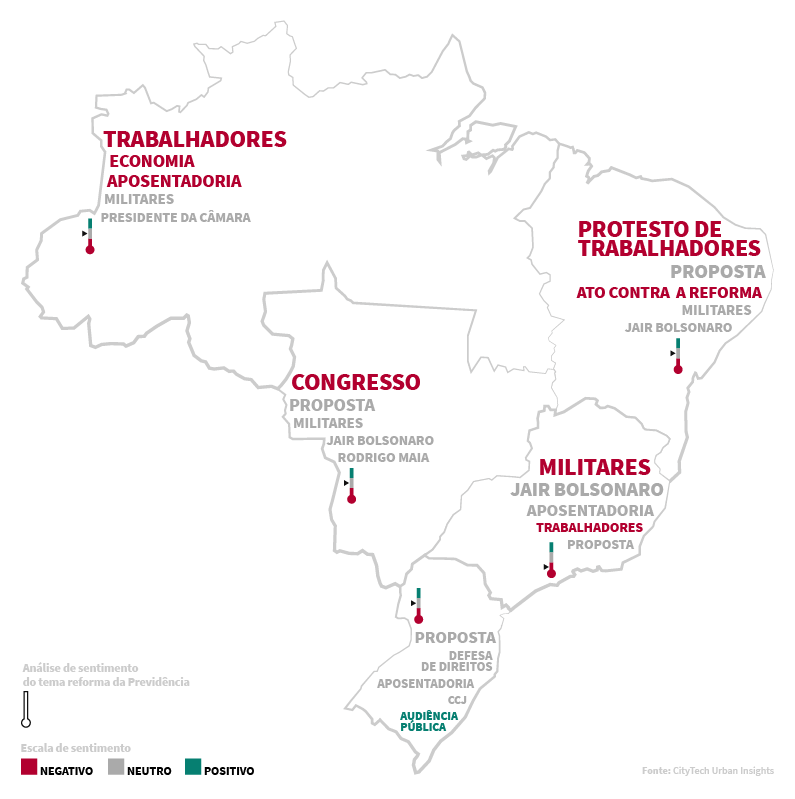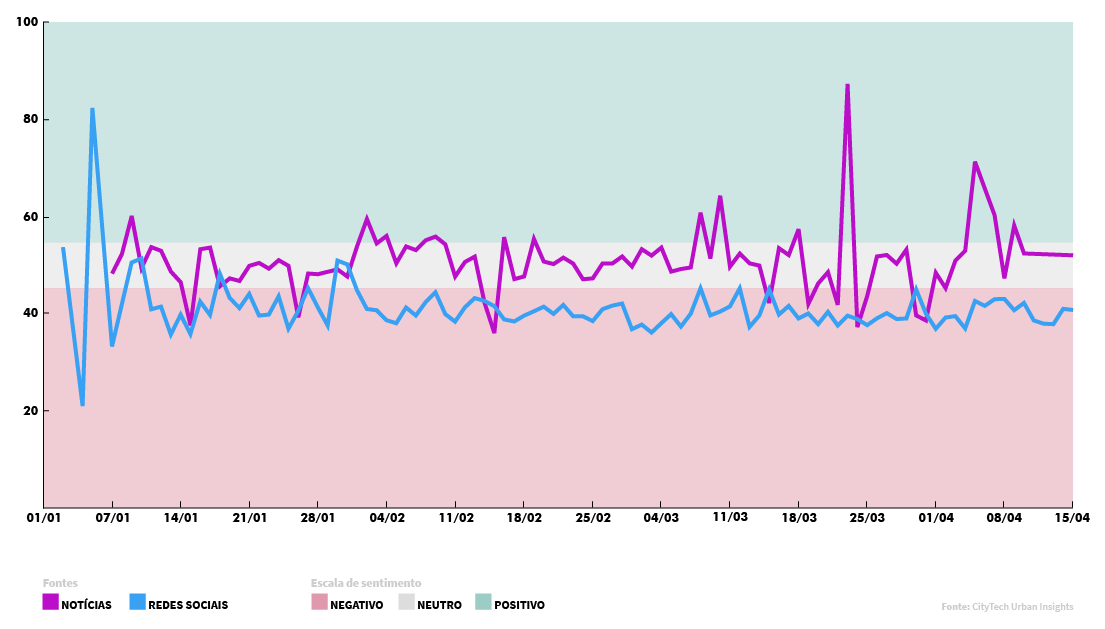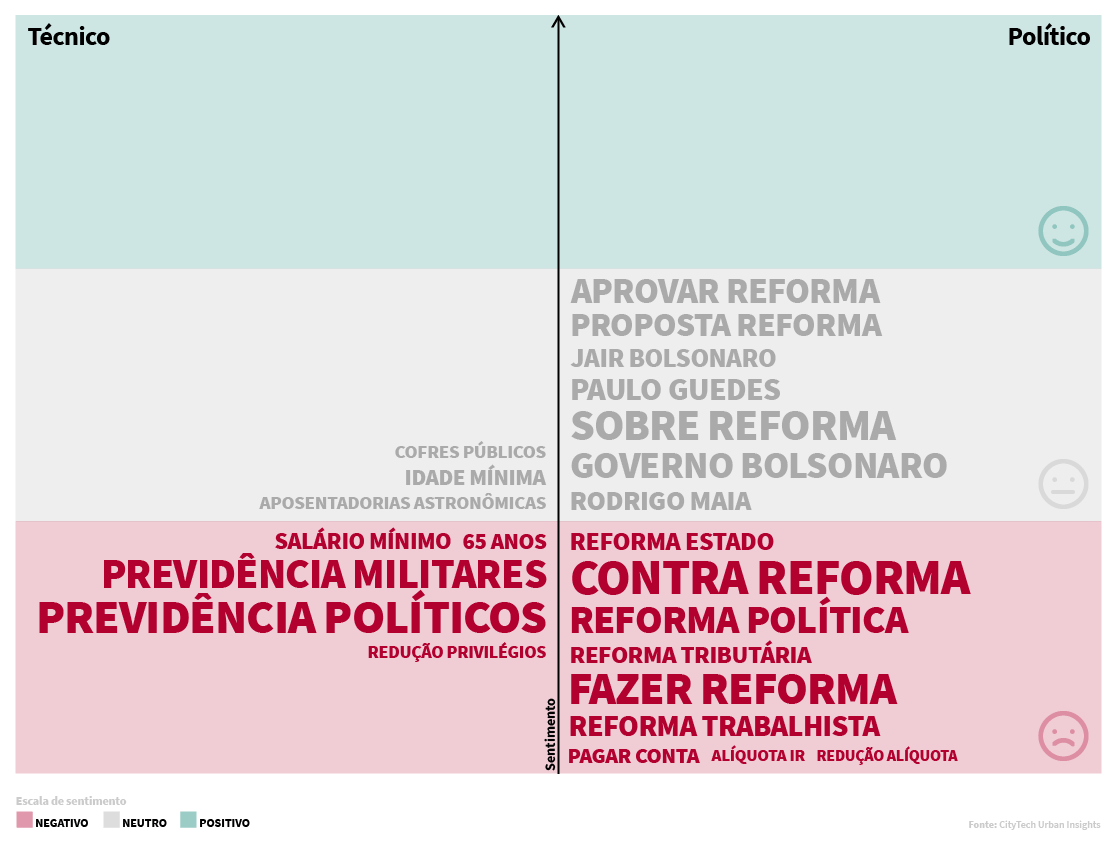Debate on Welfare Reform on the Internet: emotion prevails over reason
It is not a novelty that Brazil for long has needed important structural reforms, including Social Welfare, nor is it a novelty that the latter is one of the main - if not the main - issues that the country (and its representatives) are discussing. But, in the digital world, what is it that public opinion has said about the so much discussed Welfare Reform?
The truth is that the subject has been discussed in a politicized manner and without a deep and qualified debate about its proposals for changes and the impacts it will bring to people's lives. That is the main conclusion that Daoura reached when analyzing the text of the first 100 days of the year on the reform in social networks and the news.
Political debate versus Technical debate
The first evaluation was the identification of binomials (set of two related words) of the captured texts about the subject and separating them into two groups: those related to political debates and those related to technical debates on the reform, which in fact brings opinions and arguments about the items of the proposal.
Figure 1 shows these two groups in their respective binomials separated by the sentiment that the texts, on average, express. Negative, Neutral or Positive sentiments are understood as computational analysis that identify the sentiment expressed in a given text based on the analysis of the words used and their combinations and positions in the text.
It wasn’t possible to identify in the relevant binomial sample which texts, on average, were interpreted as positive. It’s possible to notice the concentration of texts first on the political group side and second on the "negative" sentiment axis.
The "against the reform" binomial, despite appearing to signify a lack of support on the proposal, actually means that the sentiment expressed in that text was negative, showing that these two analyses cannot be made in a correlated way.
The main conclusion here is that the largely political debate is generating a negative sentiment in public opinion on the Internet and a considerable polarization over those who believe that the reform should be done and those who have doubts or are explicitly against it.

Words associated with the topic
When we see a tag cloud with the most recurrent and relevant words to the texts on the welfare reform, we can see the lack of substantiality in the discussions, of words that in fact qualify and guide the debate more on the reform, whether on its proposals of change or its impacts. There is very little of it, which shows the lack of objectivity and quality of the debate on the subject on the Internet.

Regional differences on the debate
The map in Figure 3 illustrates the most frequently found words on texts originating from each of the country's regions, their respective average sentiment, and the relevance of that particular word for the region. It is possible to see on the map that in the North and Northeast regions negative manifestations associated with "workers" are relevant, even generating calls and acts against the reform.
Another word that appears in almost every region is “military”, which refers to the pension reform for this sector, which in the Southeast is quite relevant and negatively debated.

Variation of the sentiment of texts over time
Finally, to understand the difference between the feelings expressed on social media and news texts, we separated a graph of sentiment index variations over time, throughout the analyzed interval, and we saw that, as expected, the news vary within a neutrality range of sentiment, while the average sentiment for social media texts fluctuates on an axis of negativity, showing exactly where negative sentiment about the issue is being generated in the opinion of the digital public.

Conclusions and possible paths
Public opinion on the internet is still trying to understand the great impacts of this reform. It is clear that there are arguments and concerns, and that this is generating a negative sentiment in people regarding the topic. It is also clear that, despite the negativity, there is a need to clearly understand the proposal and mitigate all the inequities that it may bring if all the current imbalances in the prevailing system are not considered.
Communicating the proposal clearly and in popular language, so that citizens from all regions of Brazil can understand, especially in those where there’s more resistance to the proposal, is crucial for the debate to be of quality and to allow the approved reform to benefit the largest possible number of Brazilians, if not all of them, and guarantee the sustainability of the system, unlocking the Brazilian economic system and bringing more quality of life for its citizens.
In addition to communication, it is essential that forms of qualified interaction are created in virtual public spaces, in which government agents, such as the Executive and Legislative Power, promote debates on social networks more oriented to the proposal itself, starting from their own public communications on the subject, creating polls and other dynamics that actually promote popular participation on the subject.
Participatory Management, in this and any other case, is not just a way for the government and legislators to promote their own guidelines in search of political and electoral capital. It is, mainly, to consider qualified and organized public opinion in its own decisions, so that these are effective when put into practice, that is, they reflect the will of the population combined with the needs and technical aspects of the policy that is being created. If that is not done, the risk of implementing a reform that will increase the political cost of decision-makers certainly increases, resulting in the opposite of the expected effect.
Whether it’s on the Internet or in real life, welfare reform is an important concern for people in Brazil and must be carefully considered and communicated by the representatives of people in government. Hearing and communicating with citizens is essential for the success of that process.
Data sample
A sample of 33 thousand texts originating from Twitter, Facebook and news, published between 01/01/2019 and 04/15/2019, was analyzed, with direct mentions to the matter of "Welfare Reform".
